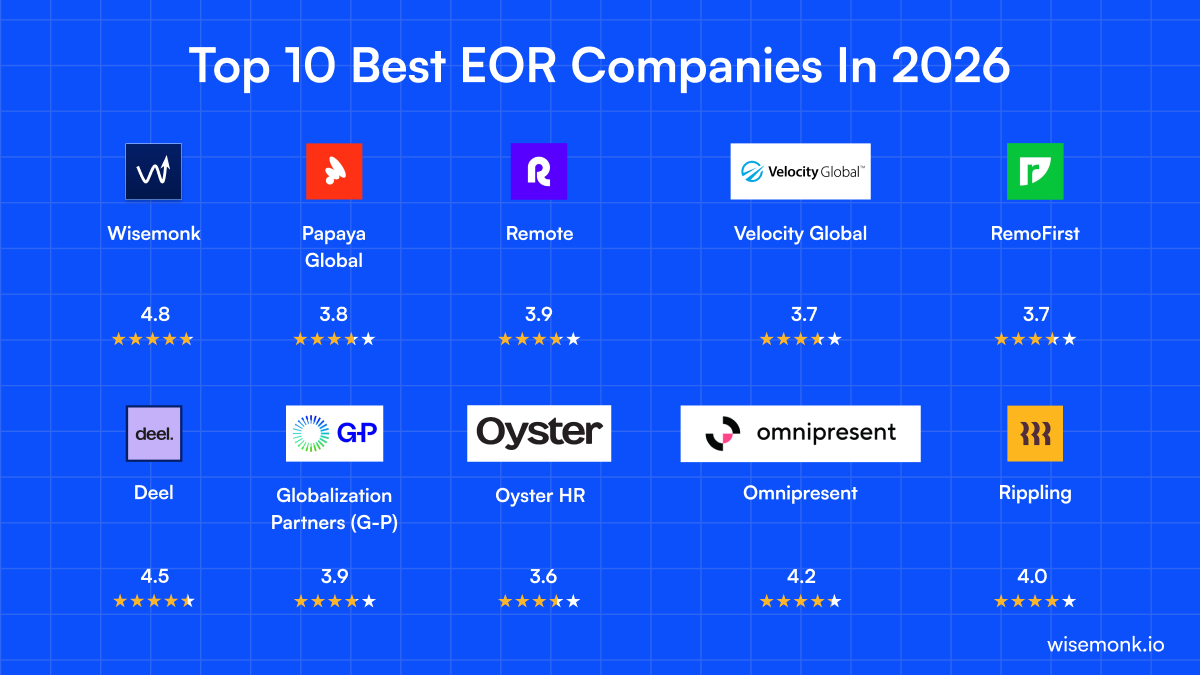Looking to expand your business with an Employer of Record in Japan? Japan's thriving economy and innovative spirit attract businesses from all over the world. Yet, entering the Japanese market means understanding local labor laws, payroll management, and a work culture unlike any other. Whether you’re a foreign company aiming to hire Japanese employees or want to optimize your expansion process, using an EOR provider can smooth your journey. In our experience as a leading EOR service provider, navigating Japanese employment regulations is essential for success. Let’s explore how you can do it right.
What Are the Core Japanese Employment Laws?[toc=Employment Law Framework]
Curious what keeps workplaces in Japan compliant and fair? Employers of record in Japan must follow four main laws that shape local employment agreements and payroll.
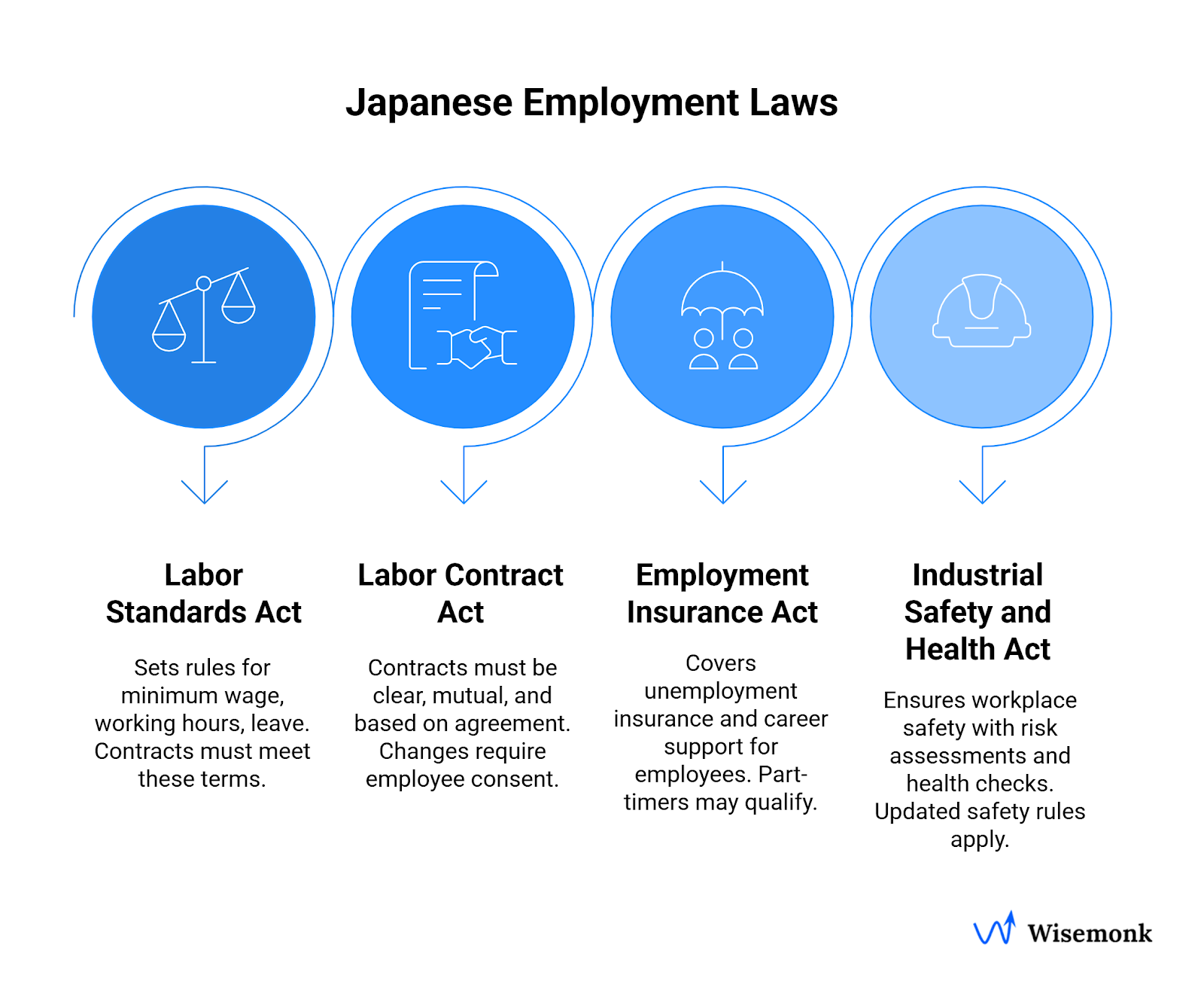
- Labor Standards Act (LSA):
Sets the rules for minimum wage, working hours (usually capped at eight hours per day), paid leave, and overtime pay. All contracts must meet or exceed these terms, anything less is automatically invalid. Equal treatment is enforced regardless of gender or nationality. - Labor Contract Act (LCA):
States that employment contracts must be clear, mutual, and based on agreement from both sides. Any changes that disadvantage employees require their consent. Most fixed-term contracts can’t exceed three years, unless for specialized roles. - Employment Insurance Act (EIA):
Covers employees with unemployment insurance and career support. As of April 2025, part-timers working at least 10 hours per week qualify for benefits. Employee and employer contribution rates have been slightly reduced this year, offering minor payroll relief. - Industrial Safety and Health Act (ISHA):
Requires all employers to ensure workplace safety by conducting risk assessments, providing mandatory health checks, and following updated safety rules for chemicals and hazards. The 2025 update added new regulated substances and extra heatstroke prevention measures for worker protection.
We’ve helped many global firms navigate global expansion, and from our experience, getting these basics right is key to hiring and managing workers smoothly in any country.
What are the Key Benefits of Japan EOR?[toc=Key Benefits of EOR]
Expanding in Japan can be complex, but using EOR services makes the process remarkably smoother. Based on our extensive research and having guided several international firms, here’s why companies choose an employer of record in Japan:
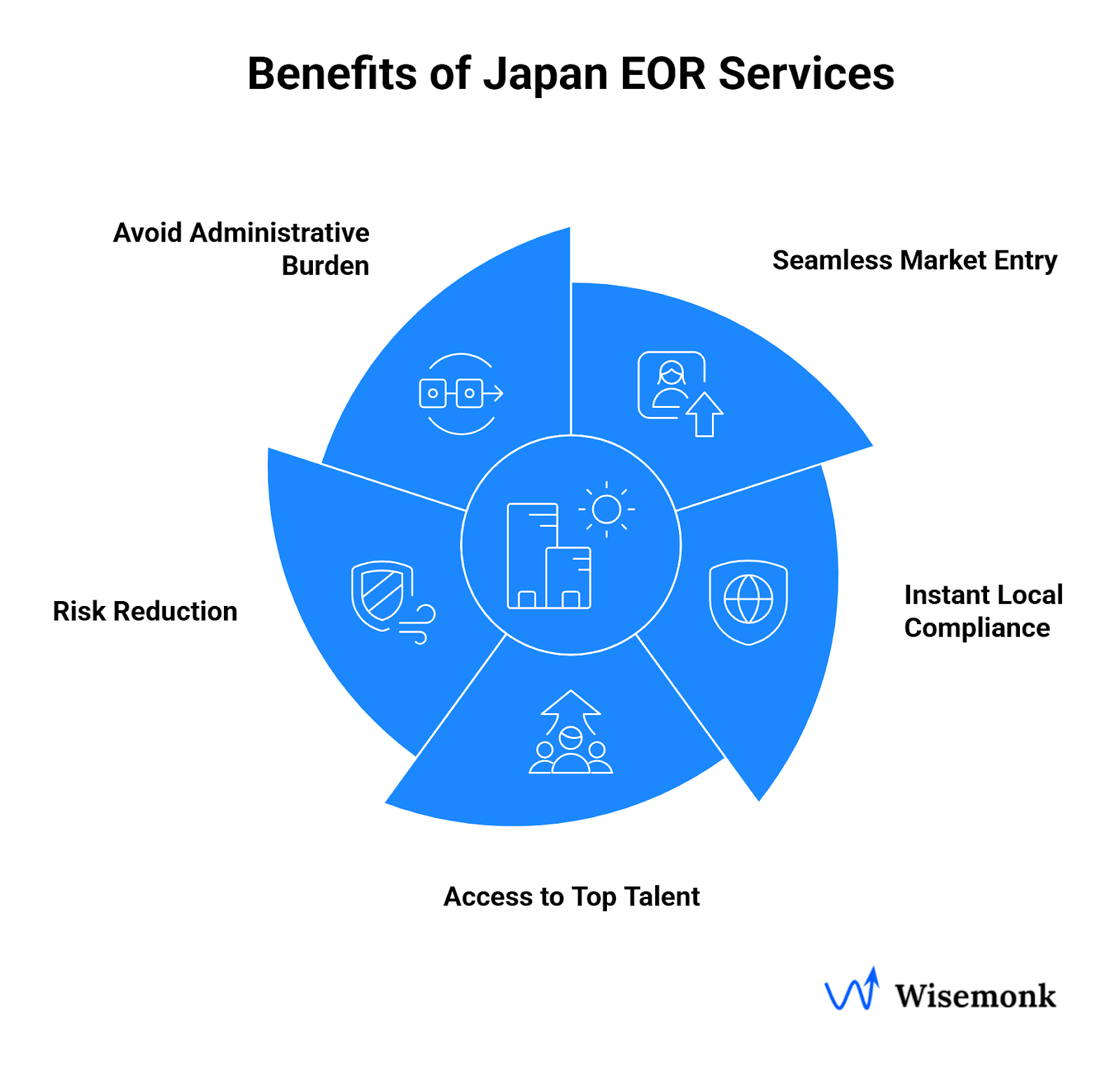
- Seamless Market Entry: You can hire Japanese employees fast, often within weeks, without forming a local legal entity, slashing time and costs compared to traditional incorporation.
- Instant Local Compliance: The EOR assumes all employer responsibilities, handling employment contracts, payroll management, tax filings, and employee benefits, all fully compliant with Japanese labor laws and regulations.
- Access to Top Talent: EOR providers leverage local expertise to help you hire skilled workers in Japan’s competitive job market while navigating culture and language differences smoothly.
- Risk Reduction: The EOR absorbs compliance risks, reducing your exposure to fines, lawsuits, or tax liabilities related to Japanese employment laws.
- Avoid Administrative Burden: All HR administration, onboarding, statutory benefits, social insurance, and payroll taxes are managed by your EOR partner, freeing your team to focus on business growth.
In our experience, partnering with an EOR has helped foreign companies explore the Japanese market confidently, avoid compliance risks, and quickly scale operations without costly delays.
How Does Payroll and Tax Compliance Work in Japan?[toc=Payroll & Tax Compliance]
Japan’s payroll and tax system might seem complex, but with the right partner, it can be smoothly managed. Here’s what employers of record need to know for 2025:
- Progressive Income Tax and Withholding: Employee income tax in Japan is progressive, ranging from 5% to 45%. Companies must withhold tax monthly and perform a final adjustment at year-end (“Nenmatsu Chosei”). For 2025, the basic deduction rises to ¥580,000 for most, increasing the non-taxable threshold for salaried employees.
- Social Insurance Contributions: Employers and employees both contribute to health insurance (4.955%), welfare pension (9.15%), and unemployment insurance (0.55%), with slightly reduced rates as of April 2025. Monthly employee contributions are capped based on salary bands and location. These social security payments are deductible for personal income tax.
- Monthly and Annual Filings: Employers file monthly tax withholdings and social insurance reports. Final tax returns must be filed individually between February 16 and March 15 each year if total income or deductions trigger a filing requirement. For companies, corporate tax returns are due within two months of the fiscal year’s end.
- Tax Treaty Benefits: Japan maintains tax treaties, like with the US, to prevent double taxation and clarify tax residency rules. This is a key benefit for global mobility and foreign employees.
Based on our experience with global payroll, managing these obligations accurately is crucial; it keeps your company compliant, your employees satisfied, and your risk of penalties low.
What Employee Benefits and Entitlements Do Workers Get in Japan?[toc=Employee Benefits & Entitlements]
Japan sets a high bar for employee benefits, so what exactly should you expect? Based on our work supporting global companies, here’s a quick guide to the essentials for 2025:
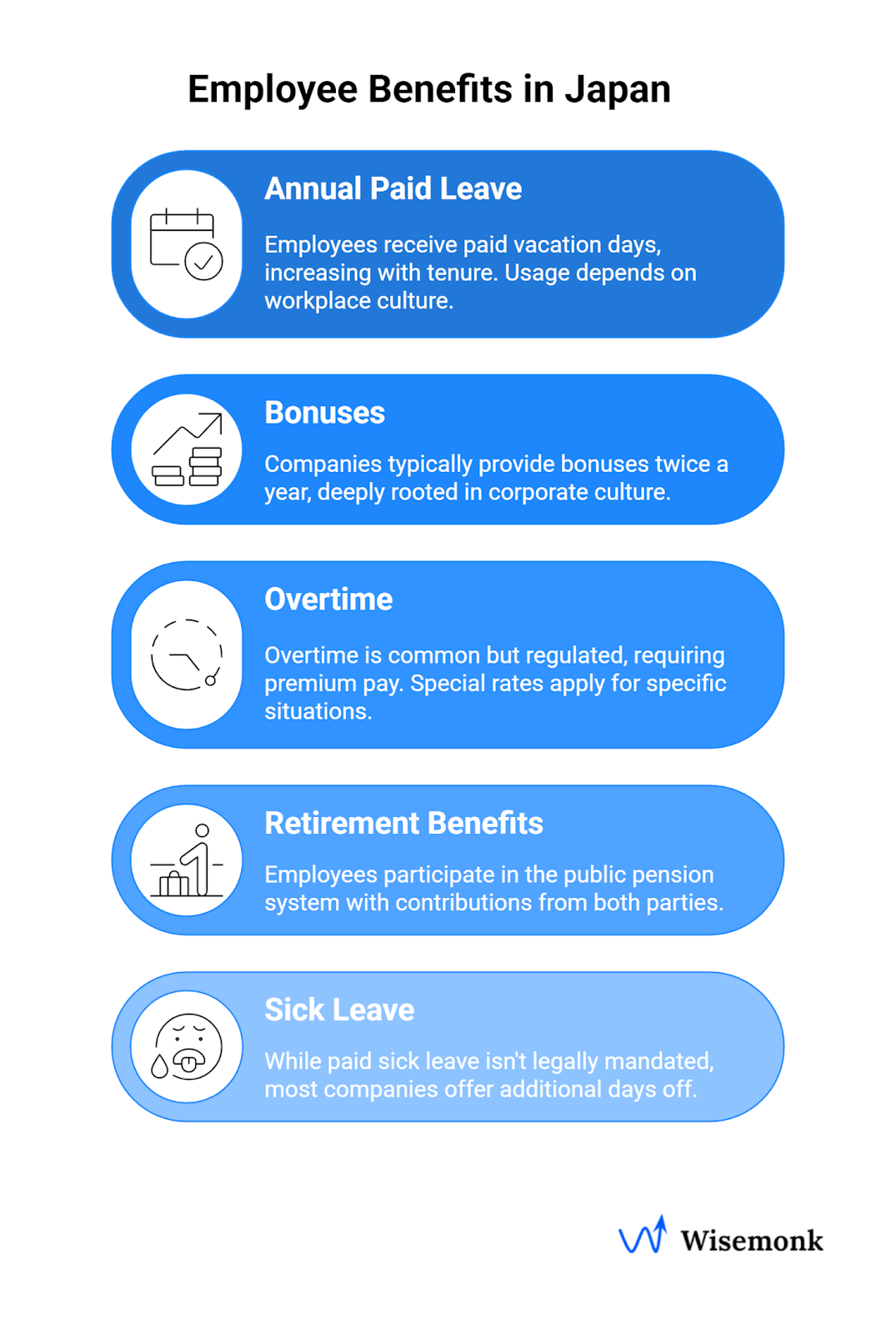
- Annual Paid Leave: Employees get at least 10 days of paid vacation after six months of service, increasing to 20 days with longer tenure. Using all this leave can depend on workplace culture, but the right to it is protected by law.
- Bonuses: Japanese companies usually grant bonuses twice a year (summer and winter). While not strictly required by law, they are deeply rooted in corporate culture and often set by employment contracts.
- Overtime: Overtime is common, but tightly controlled. Work beyond the standard eight hours per day or 40 hours per week requires premium pay, typically at least 25% more per hour. Special rates apply for late-night, holiday, and extended overtime, firmly regulated under Japanese labor law.
- Retirement Benefits: Employees are included in the public pension system (Kosei Nenkin for company workers) with both employer and employee contributions. Benefits are accessible after at least 10 years of participation, usually starting from age 65. Companies may also add private retirement plans or supplemental allowances.
- Sick Leave, Maternity, and Entitlements: While there’s no legal mandate for paid sick leave apart from statutory accident/disability coverage, most companies provide additional days off. Parental leave and health insurance (including family coverage) are standard, thanks to robust social security and insurance systems.
In our experience, having a clear benefits structure not only helps you attract and retain top Japanese employees but also keeps your business in step with statutory requirements and workplace culture.
What is the Hiring and Onboarding Process in Japan?[toc=Hiring & Onboarding Process]
Here’s how hiring in Japan works: fast, precise, and with deep respect for process. Based on our experience supporting global clients, these are the steps you’ll encounter:
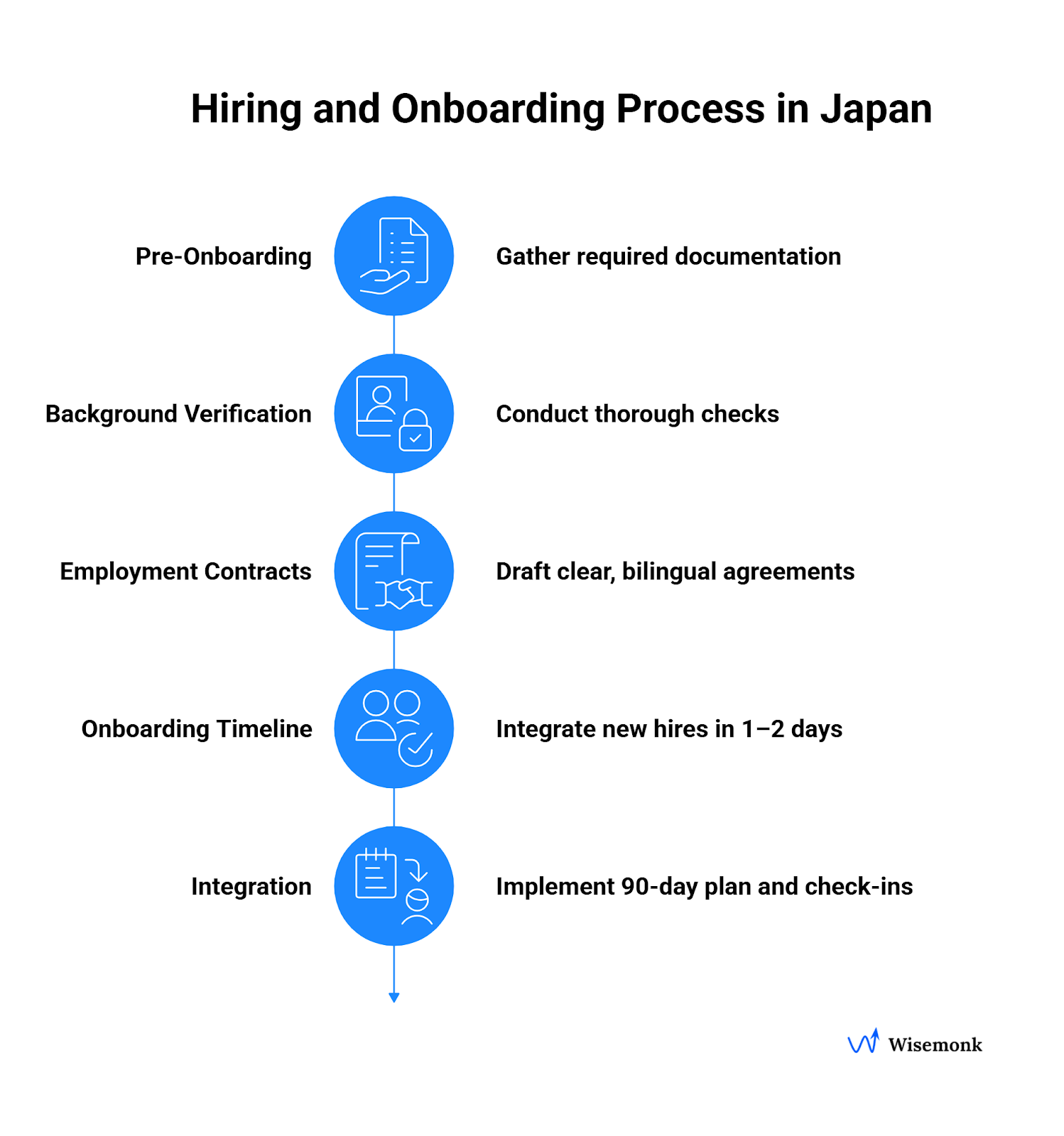
- Required Documentation: Gather the new hire’s ID (passport or residence card), recent residence certificate, and completed tax/social insurance forms. For foreign employees, a valid work visa and My Number card are essential.
- Background Verification: Always secure written consent first. Employers check education, job history, and criminal background, all under strict privacy laws, with no personal opinions gathered.
- Employment Contracts: While not always legally required in writing, it’s best practice to draft clear, bilingual contracts specifying job duties, salary, working hours, benefits, and probation period. Any change disadvantageous to the employee needs their consent.
- Onboarding Timeline: After signing, onboarding moves quickly, Japanese employers often integrate new hires within 1–2 days for EOR services. Day one includes workspace setup, app access, team introductions, orientation on workplace policies, and health/safety rules.
- Integration: New hires join team activities, receive a structured 90-day plan, and frequent check-ins, respecting Japan’s culture of hierarchy, mentorship, and group harmony.
From our extensive research, handling these steps thoughtfully ensures a smooth, compliant launch for every new employee in Japan.
How Do You Manage a Japanese Workforce Effectively?[toc=Workforce Management]
Managing Japanese employees is different from anywhere else; relationships, hierarchy, and harmony shape daily work. In our experience guiding global clients, here’s what’s essential for 2025:
- Embrace Lifetime Employment Values: Many Japanese companies still favor long-term commitment and invest heavily in employee growth, expecting loyalty and group harmony in return.
- Respect Hierarchy: Decision-making flows through clearly defined ranks. Always show deference to seniority, using job titles and proper protocols maintains smooth operations and respect in the workplace.
- Nemawashi (Consensus-Building): Before making changes, managers hold informal discussions to gather support and address concerns. Formal decisions rarely surprise anyone, as groundwork happens quietly behind the scenes. It makes transitions smoother and lowers resistance.
- Group Orientation: Teamwork and collaboration matter more than individual achievement. Success is measured as a group, and open floor plans or collective activities (like daily meetings) foster unity and mutual support.
- Performance Management: Promotions often depend on seniority and teamwork, not just individual results. Regular feedback, gentle coaching, and constructive group input drive constant improvement.
- Communication Style: Indirectness (using suggestions or consensus) is common. Avoid confrontation, build agreement through quiet dialogue, and shared goals.
Based on our extensive research and experience with global labor regulations, understanding these cultural nuances is critical for foreign companies. Managing teams with empathy and adaptability helps you earn trust, drive performance, and build long-term success in Japan.
How Does Employee Termination Work Under Japanese Employment Law?[toc=Termination Procedures]
Thinking about ending an employment agreement in Japan? It’s a careful process, Japanese labor law protects employees strongly, so every step counts. Here’s a quick breakdown:
- Strict Grounds for Dismissal: Dismissals must be objectively reasonable and justified, such as persistent poor performance, serious misconduct, or unavoidable redundancy. Employers must first try to avoid terminations, reassigning staff, offering transfers, or soliciting voluntary resignations, before considering dismissal.
- Notice Period: Employers are required to give at least 30 days’ notice or pay 30 days’ average salary instead of notice. This rule holds even after probation (if the employee has worked more than 14 days).
- Severance Pay: There’s no legal requirement for severance pay in Japan, unless it’s specified in the employment contract or company policy. Many large firms offer severance as part of a negotiated exit, but it’s not guaranteed by law.
- Voluntary Resignation: Employees usually provide 15 days’ notice to resign. Many companies aim for amicable separations, often negotiating an agreement with additional compensation, rather than enforcing a unilateral dismissal.
- Legal Risk and Documentation: Every termination should be well-documented, justified, and follow internal policies. Wrongful, or “unreasonable”, dismissal can be challenged in labor tribunals, so many businesses work closely with HR experts to avoid legal disputes.
In our experience, guiding several foreign companies, following employment regulations closely is essential to avoid costly mistakes during terminations.
What’s the Cost Analysis and Financial Planning for EOR Services in Japan?[toc=Cost Analysis & Financial Planning]
Understanding the bottom line for hiring through an employer of record in Japan requires looking at real costs and what drives them. Here’s a concise, experience-backed breakdown for 2025:
- EOR Service Pricing Models:
Most employer of record services in Japan use either a fixed monthly fee ($300–$1,700 per employee) or a percentage of payroll (10–25%). Premium models offer end-to-end payroll management, benefits administration, and HR compliance. Always check for any one-off setup or administrative costs and clarify all terms in advance. - Social Insurance Cost Implications:
Employers must budget for health insurance (4.955%), pension (9.15%), and unemployment insurance (0.55%), updated for April 2025. These compulsory payments, split with employees, are determined by salary band and ensure compliance with Japanese labor regulations and statutory benefits. - Benefits Budgeting:
Statutory benefits form the base, but companies often allocate 15–20% of salary for bonuses, retirement payouts, and perks like commuting or housing allowances. The actual percentage depends on the employment contract and industry standards. - ROI Calculations:
EOR services eliminate the high costs and administrative load of establishing a local entity, building in-house payroll, or risking compliance errors. In our experience, companies see quicker onboarding, greater payroll accuracy, and fewer legal headaches, which leads to measurable savings and faster returns on expansion efforts.
Effective cost analysis and financial planning let you scale in Japan with confidence, even as a first-time foreign employer.
What Common Challenges and Solutions Exist for EOR Services in Japan?[toc=Challenges]
Expanding with an employer of record in Japan brings unique hurdles. Here’s what matters most, based on research and our direct experience:
- Cultural fit: Japan’s team-oriented and hierarchical culture can cause confusion for new hires. Effective EORs address this with targeted local onboarding and mentorship.
- Language barriers: Communication can falter, as many processes and legal documents are in Japanese. Leading EORs offer bilingual support and translate key procedures, reducing misunderstandings.
- Complex employment laws: Strict labor rules make compliance tricky. Top EORs proactively monitor law changes, handle payroll, and ensure contracts match local requirements, reducing the risk of fines or disputes.
- Long-term employment expectations: Job stability is highly valued in Japan. EORs manage expectations early and provide retention support tailored to local norms.
- Administrative overload: Handling tax filings and statutory benefits across languages can be overwhelming. EOR technology platforms automate compliance and payroll tasks, streamlining the process for HR teams.
Choosing an experienced, locally present EOR with strong compliance practices and bilingual support is key to navigating these challenges smoothly.
Key Takeaways[toc=Key Takeaways]
Expanding into Japan via an employer of record is smart when done right. From our experience guiding global firms through global employment laws and culture, here’s what matters most:
- Choose the Right Partner: Select an EOR with local expertise, compliance skills, and bilingual support to handle Japan’s unique labor rules smoothly.
- Prioritize Compliance: Keep up with Japanese employment laws, payroll taxes, and social insurance to avoid costly risks.
- Respect Culture: Understand workplace hierarchy, communication styles, and employment expectations to build trust and retain talent.
- Manage Costs and Risks: EORs save time and money by avoiding local entity setup and reducing legal exposure.
- Plan and Communicate Clearly: Well-organized onboarding and workforce management drive smooth integration and lasting success.
In our experience, companies that combine a strong EOR partner with careful planning and cultural insight thrive in Japan’s complex market. This approach lets you hire confidently, comply fully, and grow sustainably.
Ready to expand your global workforce quickly and compliantly? Partner with Wisemonk’s Employer of Record services to effortlessly manage hiring, payroll, and compliance, so you can focus on growing your business with confidence.
Frequently asked questions
What is the concept of lifetime employment in Japan?
Lifetime employment means staying at one company from graduation to retirement, a tradition still common in large firms, but it’s slowly giving way to more flexible work styles.
How does the Japanese bonus system work?
Most companies pay bonuses twice a year (summer and winter), usually worth one to three months' salary, but the exact amount depends on company performance and contract terms.
What are the visa requirements for working in Japan?
To work in Japan, you need a job offer, a sponsor for your Certificate of Eligibility, and a valid passport; the process takes several weeks and varies by visa type.
How difficult is it to terminate employees in Japan?
It’s very hard to terminate employees in Japan; dismissals require strong justification, an extensive process, and may involve legal risks or long negotiations.
What are the cultural considerations for managing Japanese employees?
Japanese work culture values hierarchy, teamwork, harmony, and respect for others. Managers should encourage group consensus, avoid confrontation, and honor formal etiquette.
Does Japan have employer-sponsored health insurance?
Yes, Japan offers employer-based health insurance alongside National Health Insurance (NHI) and coverage for those over 75. These schemes contribute to a common fund supporting all participants.
What are the two types of health insurance in Japan?
The two main types are Health Insurance for company employees and the National Health Insurance (NHI) for others not covered by workplace plans.
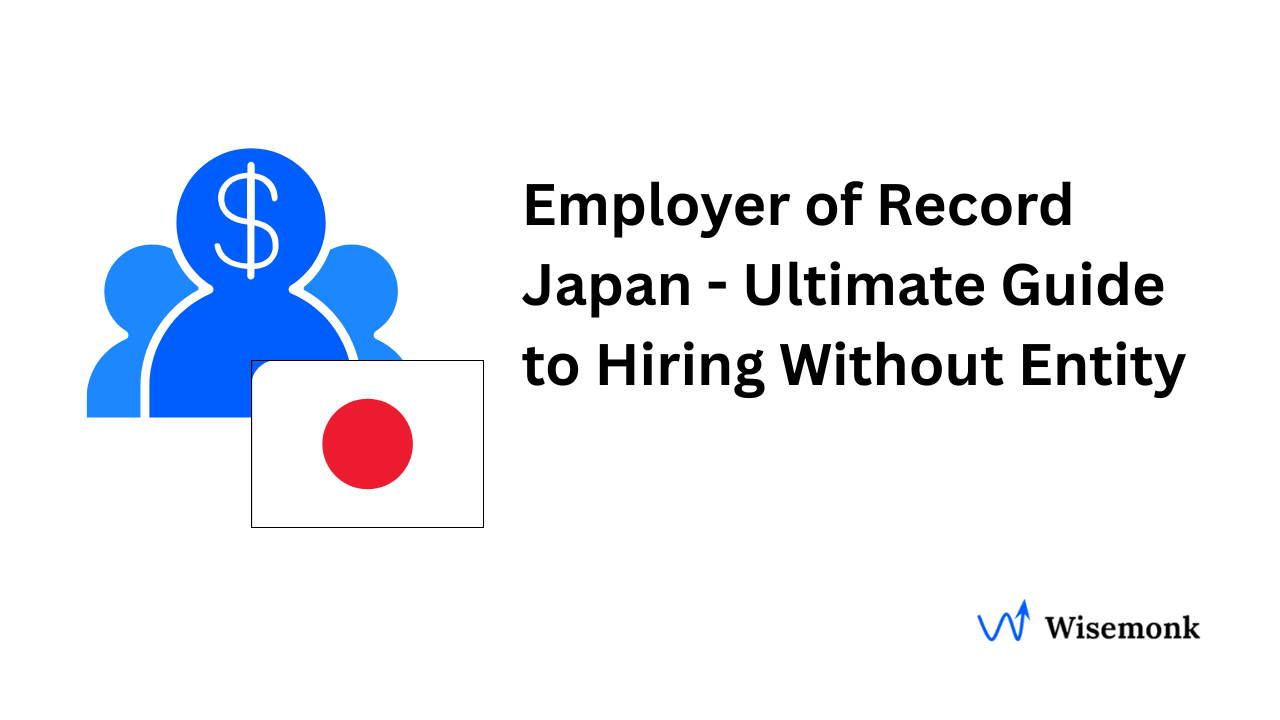
.png)
%20(1).webp)
